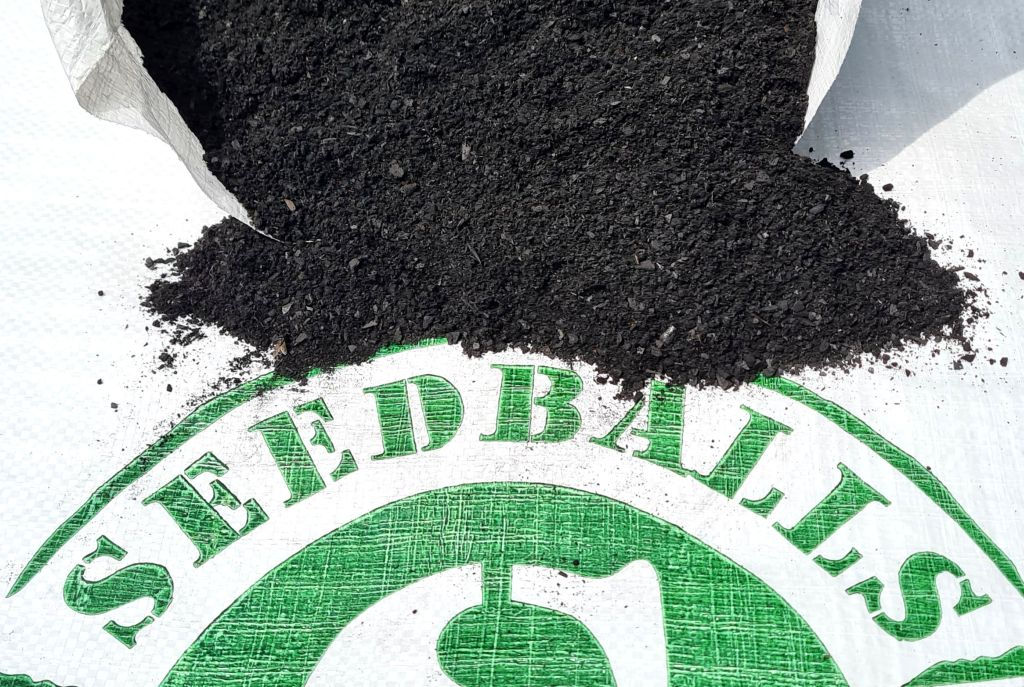

Recycling At Chardust
Cleaning up the environment to make Eco-Charcoal from pre-carbonised, salvaged material


Charcoal Dust
At least 750,000 kg of rough unprocessed lump wood charcoal is consumed within Nairobi daily, and of that amount 15% is dust, fines and chips - charcoal vendor's waste. This salvaged charcoal waste is the dust we use to make the seedballs.
Beneath every long-established charcoal sales area, scattered throughout most of Nairobi, there were literally thousands of tons of well-preserved discarded charcoal dust 'waste'- some of it dating back to the early 1900's as evidenced by old coins recovered while cleaning up the sites.

Charcoal
Chardust started cleaning up the charcoal dust waste from some of the highest-density and lowest-income urban areas of Nairobi in 1996. And by 2017 there were some 50 briquetting facilities of various sizes and sophistication who have followed Chardust's lead and methods. Chardust Ltd. is happy to see that most of this 'waste' is no longer wasted. VWB- Vendor's Waste Briquettes- are now part of East Africa's charcoal value chain.
Until the late 1970s, the raw materials for charcoal seemed inexhaustible, being ubiquitous and available at virtually no cost. Government forest reserves, open rangelands, upland watershed zones, and lowland semi-arid areas became the main sources of the fuel.
Over the years, the key dynamic factors behind the expansion of the industry have been an accelerating urban growth, agricultural land clearing, and sector profitability, especially for dealers.
Today charcoal is still a key bio-energy resource in Kenya, providing domestic energy for 82% of urban and 34% of rural households. The charcoal industry also creates jobs for wood producers, charcoal producers, transporters and vendors.


Seedballs Kenya
Seedballs Kenya is a collaboration between Chardust and Cookswell Jikos. Chardust has pioneered a method of mass producing seedballs for low cost and efficient reintroduction of trees and grass species into degraded areas in Africa. Chardust uses some of the same briquetting equipment to produce biochar seedballs for aerial reforestation and pasture regeneration.
Our seedballs are a special blend of charcoal dust, nutrients and binders sourced from long dead acacia trees that are now giving life to a whole new generation of forests thanks to more than 35 combined years of Kenyan charcoal industry expertise from Chardust Ltd and Cookswell Jikos.

Seedballs &
Reforestation
Seedballs Kenya has pioneered a method of mass producing seedballs for low cost and efficient reintroduction of trees and grass species into degraded areas in Africa.
Seedballs are inexpensive and can be easily dispersed over large areas which are often hard to reach. Our indigenous seeds, supplied and certified by the Kenya Forestry Research Institute (KEFRI), are not treated or altered in any way.
Simply put, we are giving Mother Nature a helping hand by protecting the seeds from predators and sun until the appropriate natural environmental conditions trigger germination.
Direct seeding reduces transplant shock and helps the young trees grow stronger roots which in turn helps them grow into stronger trees. We focus on the rehabilitation of land so damaged by man's activity that natural reforestation is unlikely or not possible at all.
26,318,000 Seedballs distributed since September 2016.


The
Tree-Fuel-Tree
Cycle
Biochar seedballs contain seeds that have not been pre-treated in any way. The seeds undergo grading and germination tests conducted by KEFRI and each batch can be traced back to its original seed orchard in Kenya. Otherwise the seeds within are still in their natural state.
Many seeds may respond to moisture and germinate in the first rainy season, others to a mechanical disturbance such as being trampled by wildlife or tumbled amongst rocks along a seasonal stream bed. Some may just wait and bide their time for several years.
The biochar coating of the ball helps protect the seed within from predators such as rodents and insects, dehydration, and extremes of temperature. When wet, the seedball will help retain and prolong a moist environment around the seed to encourage germination. At this time the char (charcoal powder) and other components of the seedball will offer an initial nutritious boost.
Using seedballs, the reintroduction of tree species that have been partially or completely removed from their original environments is as natural a process as can be undertaken.
We assume the role of missing seed-producing 'Mother Trees' and leave nurture to nature.


Improving soil quality by using Biochar
Hygroscopic - biochar is porous and has a large surface area so attracts & holds more water than the soil can by itself.
Increases the retention of nutrients like phosphorous and nitrogen.
Aids in decreasing the leaching of nutrients of soil in to the groundwater.
Helps in saving the nutrients from erosion due to the surface water flow.
Improves soil fertility through it's ability to host essential soil organisms, stimulating plant growth.
Due to its ability to retain soil nutrients for long periods of time, biochar reduces the need for chemical fertilizers.
Being highly stable it helps absorb emissions of carbon dioxide from organic decomposition.
Helps control the release of methane and nitrogen dioxide from the soil
